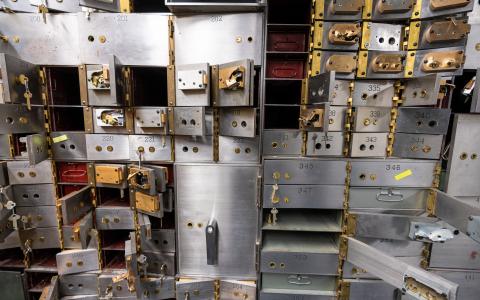
A newly established program designed to bring relief to small-business owners for payroll and operating costs will remain out of money until next week, as lawmakers have yet to reach an agreement over replenishing the diminished funds.
The Paycheck Protection Program that gives forgivable loans to small businesses ran dry Thursday after the Small Business Administration (SBA) said it exhausted its $349 billion by approving more than 1.66 million loans, an equivalent of "more than 14 years' worth of loans in less than 14 days."
Congress remains deadlocked over how to appropriate more money, an impasse that comes as roughly 22 million Americans have filed for unemployment benefits in the past four weeks. And with the next opportunity to pass legislation not until Monday and Tuesday in the Senate and House, respectively, relief for small businesses will remain stalled.
"Here's where we are, a week later, with absolutely no progress," Senate Majority Leader Mitch McConnell (R-Ky.) said on the floor. "But even now, Senate Democrats are still blocking funding."
Bipartisan talks between congressional Democrats and the Trump administration to come to an agreement over dueling funding proposals have so far proved unsuccessful. Staff members of House Speaker Nancy Pelosi (D-Calif.) and Senate Minority Leader Chuck Schumer (D-N.Y.) have had several discussions with Treasury Department officials over the past two days—including Treasury Secretary Steven Mnuchin. The "talks are ongoing," spokespersons for the lawmakers said Thursday afternoon.
Of the $251 billion additional money the administration wants, Democrats want a portion—$125 billion—to reach a wider range of recipients by going toward small, community banks and businesses owned by minorities, veterans and farmers. They're also demanding $100 billion for hospitals and local medical facilities, $150 billion for state and local governments, and for food stamp benefits to be increased by 15 percent.
Republicans and the administration simply want the $251 billion—no strings attached. The original $349 billion was provided under the $2 trillion stimulus package approved last month.
"It is absolutely surreal to see Democratic leaders treat support for workers and small businesses as something they need to be goaded into supporting," McConnell said. He later told reporters "the money for the other programs are not yet out the door. Doesn't mean we won't be dealing with it later."
Some Democrats appear to be warming to the idea of ending the stalemate and allowing the emergency funding to pass, as efforts to reach a deal since last week have yet to bear results. Democrats blocked an effort by McConnell April 9 to pass a clean version shortly before McConnell blocked Democrats' version.
Democratic Senators Tina Smith of Minnesota and Kyrsten Sinema of Arizona wrote in tweets Thursday that the small-business loan money should be approved by the chamber "ASAP." And former head of SBA Karen Mills, who was appointed by former President Barack Obama, told Roll Call the "number one" priority should be to "get the money replenished."
"Complexity is not our friend here," she told the outlet. "Things that have to be implemented quickly can't have a lot of bells and whistles, or else there will be too many unintended consequences—one of which is delay. And we don't have time to delay."
Pelosi and Schumer have yet to say there's a compromise they can support. Pelosi told reporters on a conference call Thursday there's no "disagreement about wanting to help small businesses."
"Negotiate, negotiate, negotiate. That's what we do as legislators," she said. "We hope that the administration will recognize those needs and not deprive state and local, as well as hospitals, as well as small businesses, of every opportunity to meet the needs of the people we serve."
Democrats have pointed to the calls for more funding from local and state leaders across the country. The U.S. Conference of Mayors endorsed the Pelosi-Schumer proposal, and the governors of Maryland, Pennsylvania, Michigan and Wisconsin have been among state leaders who've requested more resources.
As Mnuchin and Democrats continue their talks, Republicans are standing by for a deal all sides can support.
"I hope our colleagues will come around soon," McConnell said of Democrats.
This article originally appeared on Newsweek.



